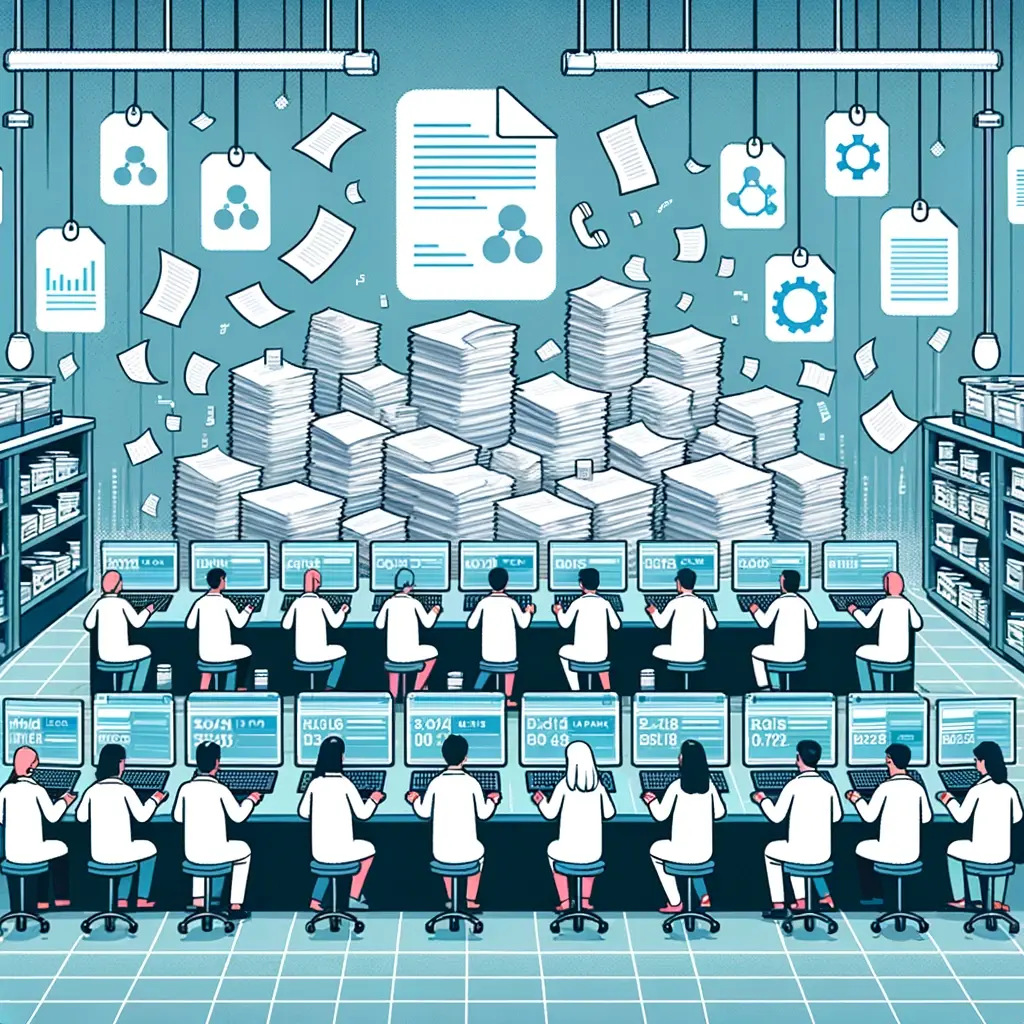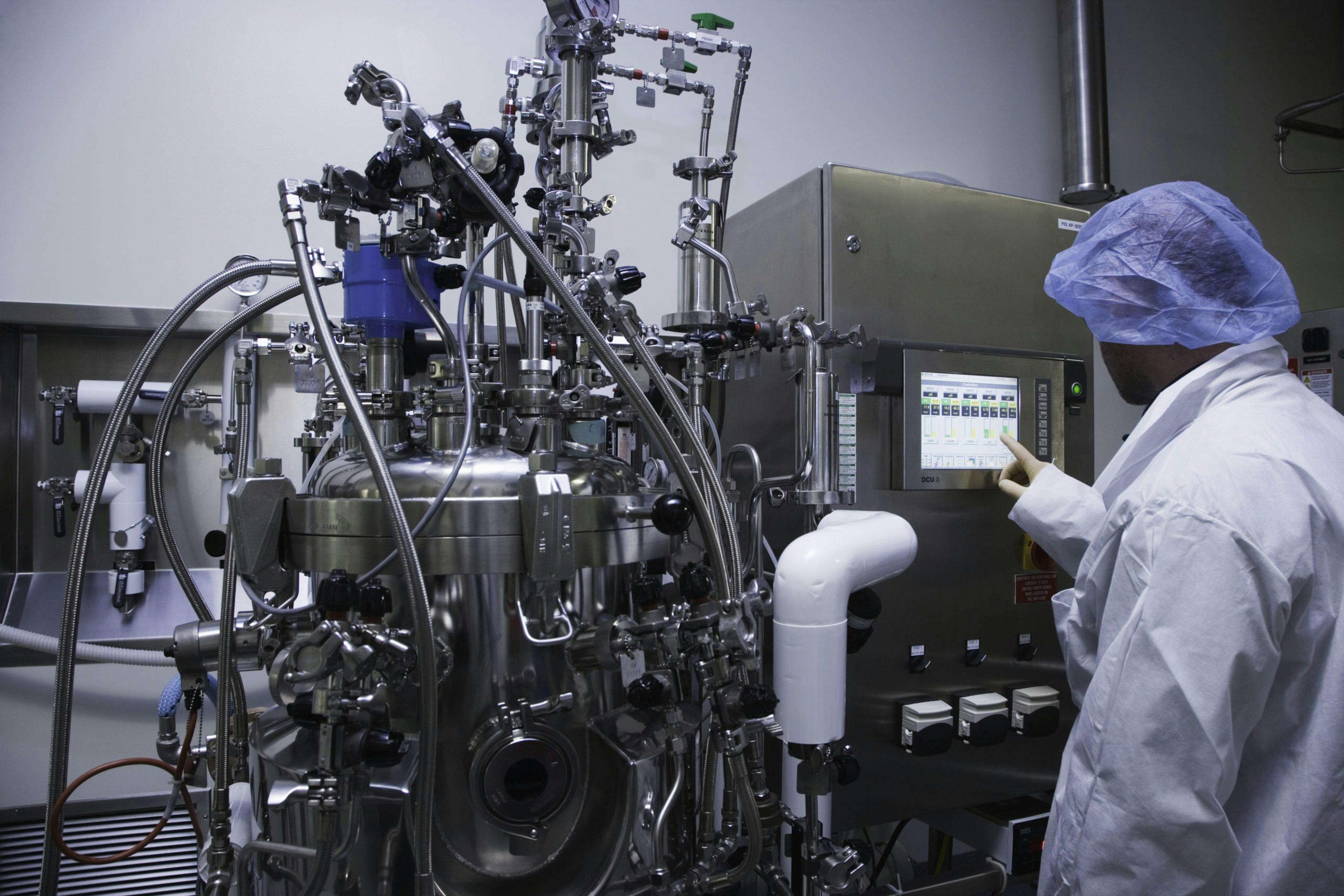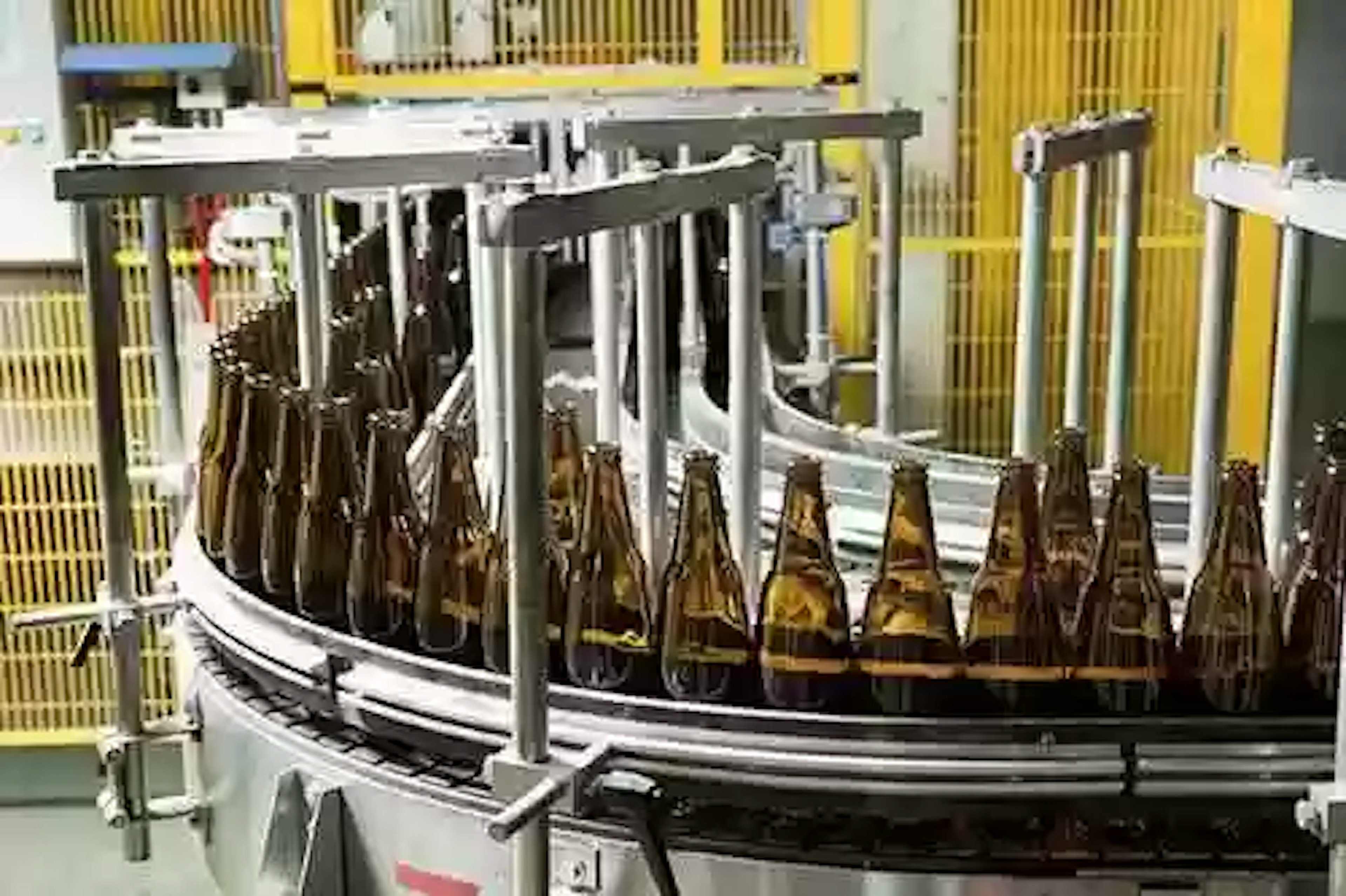- 25 Jul, 202410 minute read
What is sample management?
Tali KauffmannProduct Marketer at OpviaSample management is crucial for organising and tracking samples throughout their lifecycle in a laboratory. This article will explain what sample management is, the different types of sample management systems available, and how they have evolved.
- 19 Jul, 202420 minute read
Manufacturing Software: A Buyer’s Guide (2024)
Tali KauffmannProduct Marketer at OpviaManufacturing software helps manufacturers streamline production, reduce errors, and improve efficiency. This article explains what manufacturing software is, the different types available, and how it has evolved from paper-based to digital systems.
- 19 Jul, 202416 minute read
What is a laboratory information management system (LIMS?)
Tali KauffmannProduct Marketer at OpviaA Laboratory Information Management System (LIMS) is specialised software that helps labs manage their data and workflows efficiently. It tracks samples, organises data, automates routine tasks, and generates reports, acting like a digital assistant for the lab.
- 12 Jul, 20243 minute read
OGI Bio selects Opvia's GxP OS to manage quality in microbial automation
Tali KauffmannProduct Marketer at OpviaEdinburgh, Scotland – OGI Bio, an innovative company specialising in the automation of microbial culturing, has chosen Opvia as its Electronic Quality Management System (eQMS) provider.
- 12 Jul, 202414 minute read
What is Lean Documentation?
Rachel LimCDMO/CROs at OpviaLean documentation is an approach to creating and managing documentation that puts emphasis on efficiency, simplicity, and value. The concept of lean documentation focuses on reducing ‘waste’ and maximising ‘value’, i.e.
- 02 Jul, 20243 minute read
Revyve selects Opvia for electronic batch record (EBR) system in alternative protein production
Tali KauffmannProduct Marketer at OpviaWageningen, Netherlands – Revyve, a trailblazer in sustainable food production, has selected Opvia as its trusted partner for its Electronic Batch Records (EBR) solution.
- 02 Jul, 202412 minute read
Top Pharmaceutical Consulting Firms in 2024
Ivor LangleySolutions Consultant at OpviaNavigating the dynamic pharmaceutical industry is a continuous and onerous process. From rigorous regulatory requirements to the intricacies of drug development, the journey to bringing new pharmaceutical products to market comes with many challenges.
- 01 Jul, 202414 minute read
ISO Audit: Everything You Need to Know
Nandita MishraGrowth at OpviaAn ISO audit checks if a company’s quality management system meets ISO standards. These audits ensure that businesses maintain high-quality and regulatory standards.
- 26 Jun, 202416 minute read
Change Control in the Pharmaceutical Industry: Essential Guide
Kabir SahotaSolutions Consultant at OpviaChange control in the pharmaceutical industry is the process of managing changes to processes, systems, or products to ensure they don't compromise quality or compliance.
- 21 Jun, 202412 minute read
Non-Conformance Report: the Complete Guide
Tali KauffmannProduct Marketer at OpviaA Non-Conformance Report (NCR) is a crucial document in quality management used to find and address any deviations from set standards in products, services, or processes.
- 21 Jun, 202412 minute read
Quality Document Control: ISO 9001 Best Practices
Tali KauffmannProduct Marketer at OpviaDocument control is a key part of quality management, ensuring that all documents are accurate, up-to-date, and accessible. This article will cover how document control involves creating, reviewing, approving, distributing, and archiving documents to maintain consistency and compliance.
- 14 Jun, 20245 minute read
Why personalised medicine needs to be digital
Thomas OwenPharmaceuticals at OpviaPersonalised medicine, driven by compounding pharmacies, customises medications to meet individual patient needs. Unlike regular pharmacies, they adjust dosages, mix drugs, or remove allergens as per a doctor's prescription.
- 13 Jun, 202416 minute read
Good distribution practices: a guide to GDP compliance
Tali KauffmannProduct Marketer at OpviaGood Distribution Practices (GDP) are vital in the pharmaceutical industry to make sure products are handled, stored, and transported safely throughout the supply chain.
- 12 Jun, 202415 minute read
Top 15 life sciences conferences to attend in 2024
Tali KauffmannProduct Marketer at OpviaThe life sciences industry is always changing and growing, covering areas like biotechnology, pharmaceuticals, medical devices, and healthcare. For professionals in this field, it's important to keep up with the latest advancements, trends, and regulatory updates.
- 07 Jun, 202412 minute read
Why QMS is Dead
William MossCEO at OpviaFor decades, Quality Management Systems (QMS) have been the cornerstone of quality and compliance in the life sciences industry. However, as technology advances and the pace of innovation accelerates, these traditional systems are increasingly becoming relics of the past.
- 06 Jun, 202412 minute read
21 CFR Part 11 Compliance: Complete Guide [free checklist]
Tali KauffmannProduct Marketer at OpviaStaying compliant with FDA 21 CFR Part 11 is crucial for keeping data accurate and secure in life sciences industries. This guide breaks down everything you need to know about 21 CFR Part 11, including key requirements, common challenges, and practical tips.
- 06 Jun, 202412 minute read
How much does ISO 9001 certification cost? [Comprehensive Guide 2024]
Tali KauffmannProduct Marketer at OpviaISO 9001 certification is a globally recognised standard that ensures your business meets high-quality management principles. While the certification process can seem daunting, understanding the costs involved can help you plan better.
- 06 Jun, 20246 minute read
Introducing Opvia’s Free Procedure Management System - Build Your QMS in 4 Easy Steps
Orian PeledSoftware Engineer at OpviaAt Opvia, our mission is simple yet ambitious: we aim to empower companies across various industries to deliver life-changing products in days, not decades. To achieve this, we've developed a single system-of-record that seamlessly connects procedures to executions.
- 05 Jun, 20242 minute read
Opvia partners with IMU Biosciences to support immune profiling innovation
Tali KauffmannProduct Marketer at OpviaOpvia, a leader in quality management solutions, announced today that it has signed an agreement with IMU Biosciences (‘IMU’), a biotechnology company unlocking systems level immune data and AI to advance precision medicine, to provide Electronic Quality Management System (‘eQMS’) services.
- 31 May, 20246 minute read
503a vs 503b: Understanding the Key Differences
Bridget WithersFounder Associate at OpviaPharmaceutical compounding enables customisation of medications for specific patient needs and is crucial in the healthcare industry. The landscape of compounding is regulated by distinct frameworks, namely 503a and 503b, each with its unique requirements and standards.
- 31 May, 20248 minute read
What the FDA’s new Laboratory Developed Test (LDT) Regulations mean for your lab
Wiktoria BulikPharmaceuticals at OpviaIn recent years, Laboratory Developed Tests (LDTs) have garnered significant attention, particularly during the COVID-19 pandemic. If you’ve had a COVID-19 test or undergone genetic testing, it was likely an LDT.
- 29 May, 20248 minute read
cGMP and GLP: understanding the key differences
Tali KauffmannProduct Marketer at OpviaThere are two essential regulatory frameworks that help achieve high levels of compliance and quality in the pharmaceutical industry. These are Current Good Manufacturing Practices (cGMP) and Good Laboratory Practices (GLP).
- 29 May, 20247 minute read
Quality Control vs Quality Assurance (QA vs QC): key differences explained
Tali KauffmannProduct Marketer at OpviaUnderstanding the differences between Quality Assurance (QA) and Quality Control (QC) is essential for effective quality management. While QA focuses on preventing defects through process improvements, QC concentrates on identifying and correcting defects in final products.
- 28 May, 20248 minute read
ISO 9001 vs ISO 13485: what are the key differences?
Ivor LangleySolutions Consultant at OpviaWhat are ISO standards 9001 and 13485, and what do they cover? This article aims to answer those questions and to highlight the key differences between the two. ISO (the International Organisation for Standardisation) is a worldwide, independent, non-governmental standard development organisation, made up of representatives from each of its member countries.
- 23 May, 202412 minute read
Clinical quality assurance: the complete guide
Tali KauffmannProduct Marketer at OpviaClinical Quality Assurance (CQA) plays a crucial role in clinical trials and healthcare. It involves different practices and tools aimed at making sure clinical research and healthcare services follow high quality standards.
- 16 May, 20247 minute read
Lab digitalisation: why strategise before exploring?
Yaasir SuleimanPharmaceuticals at OpviaLab digitalisation is here to stay. But the increasing uptake of ELN and LIMS solutions isn't just a response to the demand for standardised workflows and ensuring regulatory compliance; it's how companies use automation to scale and stay innovative.
- 14 May, 202414 minute read
What is GMP Software?
Tali KauffmannProduct Marketer at OpviaQuality and compliance in manufacturing are essential. Good Manufacturing Practice (GMP) is the standard that helps achieve this.
- 09 May, 202411 minute read
What is automated data processing?
Mina IlievaData Integration Expert at OpviaModern companies in regulated industries, like manufacturing and pharmaceuticals, need to make data-driven decisions quickly and securely. To gain a competitive edge, enterprises need efficient systems to store and process data, particularly as they adopt AI.
- 07 May, 202413 minute read
The complete guide: ISO 13485 certification for medical device manufacturing
Tali KauffmannProduct Marketer at OpviaFor medical device manufacturing, quality and compliance are crucial. An essential standard for any company hoping to bring a medical device to market is the ISO 13485 certification. ISO 13485 is a voluntary iso intended to help organisations design systems that consistently produce high-quality medical devices.
- 02 May, 202415 minute read
11+ compliance and risk management courses for quality managers
Tali KauffmannProduct Marketer at OpviaQuality managers are at the frontline of safeguarding an enterprise's integrity. Whether in pharmaceuticals, biotech, food and beverage, medical devices, or any industry with a need for serious regulatory compliance, being equipped with the best skills and knowledge is crucial.
- 30 Apr, 20247 minute read
Automating 40% of Clonakilty distillery processes and improving traceability
Tali KauffmannProduct Marketer at OpviaClonakilty Distillery is a family-owned operation based on the scenic coast of Ireland. Founded in 2019 by the Scully family, it uses its unique maritime climate to produce distinctive whiskies and gins.
- 16 Apr, 202413 minute read
EBR system comparison: Top 5 solutions for 2024
William MossCEO at OpviaManufacturers looking to adopt electronic batch records (EBR systems) often find decision-making difficult. Pinpointing exactly what features will best serve their organisation isn't always easy.
- 09 Apr, 202419 minute read
How to improve your EBR workflow - step by step
Tali KauffmannProduct Marketer at OpviaMany manufacturers who have already implemented an Electronic Batch Record (EBR) system may believe they're well-on the path to digitisation and greater efficiency.
- 26 Mar, 202414 minute read
How to transition from a laboratory notebook to an ELN
Thomas OwenPharmaceuticals at OpviaFor labs looking to make the jump from laboratory notebooks to electronic laboratory notebooks (ELN), it can seem like quite a big change. Increasingly, it's becoming the norm to digitise lab records and procedures.
- 20 Mar, 20249 minute read
What is a batch manufacturing record? A brief overview
William MossCEO at OpviaBatch manufacturing records (BMRs) are detailed documents that track every step of making a product in manufacturing plants. These files include what materials are used, the unique ID for each product batch, how long each part of the process takes, and the checks done to ensure the product is made correctly.
- 19 Mar, 202414 minute read
What is an electronic quality management system (eQMS)?
Thomas OwenPharmaceuticals at OpviaAn electronic quality management system (eQMS) digitises how quality control is managed. It replaces paper-based systems with digital systems, integrating record-keeping, workflow automation, and quality checks into one platform.
- 18 Mar, 20243 minute read
Ingenza selects Opvia as its QMS provider to elevate biotech innovations
Tali KauffmannProduct Marketer at OpviaEdinburgh, Scotland – Ingenza, a dynamic CDMO and leader in engineering biology, is pleased to announce its strategic partnership with Opvia, a Quality Management Systems (QMS) provider.
- 21 Feb, 20243 minute read
MiAlgae Selects Opvia as Its Trusted Partner for EBR, ELN, and QMS Solutions
Tali KauffmannProduct Marketer at OpviaEdinburgh, Scotland - MiAlgae, a trailblazer in sustainable microalgae production for pet food and aquaculture feed, has chosen Opvia as its provider for Electronic Batch Records (EBR), Electronic Lab Notebook (ELN), and Quality Management System (QMS) solutions.
- 09 Feb, 20243 minute read
Bioomix selects Opvia as its ELN Provider to Accelerate Biotech Innovations
Tali KauffmannProduct Marketer at OpviaOdense, Denmark – Bioomix, a Danish biotech company specialising in microbial bio-solutions, has chosen Opvia as its Electronic Lab Notebook (ELN) and data management system provider.
- 29 Jan, 20249 minute read
ERP VS MES - What do they mean and what are their differences?
Rachel LimCDMO/CROs at OpviaThere are various abbreviations that are often thrown around in the process development and manufacturing landscape. You may have heard of ERP and MES - but what do they actually refer to? As the name suggests, Enterprise Resource Planning (ERP) is a tool that supports the planning of resources within an organisation - this usually covers the 4Ms as follows: - Manpower: apart from human resources, this also includes the skills, technology, and organisational resources - Machine: often refers to equipment and instruments, but can also include hardware or apparatus unique to specific manufacturing industries.
- 16 Jan, 202410 minute read
Key Features to look for in an ELN
Bridget WithersFounder Associate at OpviaAs labs continue to modernise and pivot from traditional to digital record-keeping, Electronic Laboratory Notebooks (ELNs) stand out as key tools in this transformation.
- 10 Jan, 20249 minute read
Why Every Modern Lab needs an Electronic Lab Notebook
Tali KauffmannProduct Marketer at OpviaAn Electronic Lab Notebook (ELN) is a digital platform designed to replace traditional paper lab notebooks. It serves as a tool for scientists and researchers to record and store experimental data, observations, and results in an electronic format. Gone are the days of bulky, coffee-stained paper notebooks brimming with hand-written notes.
- 14 Oct, 202321 minute read
A 7-Step Guide to Building a FAIR and Regulatory-Compliant Ontology: Mobilizing Data for Bioprocess Excellence
William MossCEO at OpviaIn the intricate and highly regulated world of bioprocess development and manufacturing, data is more than just a byproduct—it's a critical asset. The complexities involved in developing and manufacturing biotherapeutics, vaccines, and other biological products are immense.
- 10 Oct, 20237 minute read
5 Tips to Implement a Quality Management System
Thomas OwenPharmaceuticals at OpviaHow can my company deliver peak productivity, high product quality, and strong compliance with industry standards? How can I simplify the complexities of internal policies, processes, and procedures? These are common questions that come up to those in quality management or compliance.
- 10 Oct, 20234 minute read
What is a QMS and why should you use one?
Luke JenemaBusiness Development Manager at OpviaWhen it comes to tracking quality, often times Quality Managers find themselves struggling with paper processes, or indebted to the dreaded process we call “Folder Hopping”.
- 6 Oct, 20235 minute read
Unlock the Potential of Quality Management Systems
Thomas OwenPharmaceuticals at OpviaIn the dynamic and highly regulated fields of biotechnology and pharmaceuticals, ensuring product quality is of paramount importance. A robust quality management system (QMS) is a fundamental component of this endeavour, offering a structured approach to guaranteeing that every aspect of product development, manufacturing, and distribution meets the highest standards.
- 3 Oct, 20234 minute read
How electronic batch records facilitate the implementation of AI techniques
Rachel LimCDMO/CROs at OpviaAI can help identify inefficiencies in manufacturing processes and suggest ways to optimise them. AI can also be used to monitor production data and make predictions about future outcomes.
- 02 Oct, 20234 minute read
Avoid These 5 Common Pitfalls When Implementing Electronic Document Management in Food and Beverage Manufacturing
Thomas OwenPharmaceuticals at OpviaIn today's fast-paced food and beverage manufacturing industry, staying ahead means embracing digital transformation. Electronic Document Management Systems (EDMS) are the backbone of efficient operations, ensuring compliance, streamlining workflows, and enhancing productivity.
- 01 Oct, 20237 minute read
Why should you switch to electronic batch records?
Rachel LimCDMO/CROs at OpviaIn a manufacturing landscape characterized by stringent regulations, quality control, and the ever-pressing need for efficiency, accurate documentation and data management are paramount.
- 14 Sep, 20232 minute read
How an electronic batch recording system helps with CAPA planning
Rachel LimCDMO/CROs at OpviaCAPA is a corrective and preventive action plan that's implemented in a manufacturing process to ensure the quality of the products being produced. But having a CAPA plan is just one part of the equation - having a system in place to track and record these corrective and preventive actions is vital.
- 13 Sep, 20234 minute read
Documenting Success: Crucial Forms for Regulatory Adherence in Canada's Cannabis Sector
Alberto Frias FernandezF&B Expert at OpviaCanada's cannabis industry has undergone a profound transformation, propelled by regulatory frameworks enforced by Health Canada. As the nation embraced the legalization of cannabis for medical and recreational use, the regulatory body, Health Canada, established stringent guidelines to ensure quality, safety, and compliance within this burgeoning sector.
- 2 Sep, 20235 minute read
What are the EU regulations to comply with for EBRs?
Rachel LimCDMO/CROs at OpviaExplore the complexities of European Union regulations governing Electronic Batch Records (EBRs) in our comprehensive guide. From GDPR to ISO/IEC 27001, this in-depth article outlines the scope, compliance requirements, and record-keeping obligations for each key regulation affecting EBRs.
- 01 Sep, 20235 minute read
Top 5 benefits of electronic batch records
Rachel LimCDMO/CROs at OpviaIn today's highly regulated manufacturing environment, accurate documentation and data management are crucial for compliance and operational excellence. This is particularly true for industries like pharmaceuticals, food and beverages, and chemicals, where batch processing is a core part of the manufacturing workflow.
- 28 Aug, 20234 minute read
The Crucial Role of Document Management Systems in Empowering Social Enterprises
Alberto Frias FernandezF&B Expert at OpviaIn the realm of social enterprises where the pursuit of social impact intertwines with business sustainability, the significance of streamlined operations cannot be overstated.
- 14 Aug, 20232 minute read
How an electronic batch recording software can help with DES models
Rachel LimCDMO/CROs at OpviaWhen it comes to discrete event simulation (DES), electronic batch recording software can play a big role in recreating a factory in the virtual world. This type of software is versatile and has various applications, such as scheduling, capacity planning, resource allocation, bottleneck identification, and scenario analysis.
- 08 Aug, 202310 minute read
The Essential KPIs to Automate from Your EBR – Transform the Quality and Efficiency of Your Manufacturing
Rachel LimCDMO/CROs at OpviaThe manufacturing sector has never been more complex, especially in highly regulated industries such as pharmaceuticals, biotechnology, food, and beverages. As regulatory pressures mount and consumer expectations rise, companies in these sectors are turning towards technology to help them navigate these challenges.
- 3 Aug, 20234 minute read
The API development process and how an EBR can help
Rachel LimCDMO/CROs at OpviaWhen it comes to developing active pharmaceutical ingredients (APIs), efficiency and reliability are key. That's where an electronic batch record comes in.
- 13 Jul, 20234 minute read
Driving Progress in Plastics Research: Enhancing Efficiency and Innovation
Thomas OwenPharmaceuticals at OpviaIn the ever-evolving field of plastics and compounding, researchers face the challenge of developing new materials with improved performance, sustainability, and cost-effectiveness.
- 03 July, 20237 minute read
How to Implement Electronic Batch Records in a Brewery: An In-Depth Guide
Rachel LimCDMO/CROs at OpviaIn the brewing industry, the marriage between tradition and technology can be a complex but rewarding relationship. This is especially true when it comes to integrating Electronic Batch Records (EBRs) into brewing processes.
- 30 Jun, 20234 minute read
Advancing Cosmetics Research: Accelerating Innovation and Sustainability
Rachel LimCDMO/CROs at OpviaIn the dynamic world of cosmetics and consumer goods, staying ahead of market demands and continuously innovating is crucial for success. Cosmetics R&D companies are constantly exploring new ingredients, formulations, and technologies to develop products that resonate with consumers and align with sustainability goals.
- 16 Jun, 20235 minute read
What to look for in a Scientific Data Management System (SDMS)
Thomas OwenPharmaceuticals at OpviaIn today's data-driven world, scientific research and discoveries heavily rely on the collection, storage, and analysis of vast amounts of data. As data volumes continue to grow exponentially, the need for an efficient and robust scientific data management system becomes imperative.
- 06 Jun, 20233 minute read
What to look for in an electronic batch record system?
Rachel LimCDMO/CROs at OpviaWhat are the requirements for your specific business? Will the system be compatible with your existing hardware and software? How user friendly is the interface? These are just a few of the questions you'll need to answer before making a decision to switch to an electronic batch recording system.
- 02 Jun, 20234 minute read
Top 3 pain points of a manufacturing process in the bioprocessing industry and how an EBR can help
Rachel LimCDMO/CROs at OpviaElectronic batch records are an essential part of the bioprocessing industry. These records often include information about the process such as the material lot numbers, equipment identifications, yield calculations, and count reconciliations which are important to track and control in a high-risk industry such as this one.
- 30 May, 20233 minute read
Best Practices for a perfect EBR for CDMOs
Rachel LimCDMO/CROs at OpviaThe global contract development manufacturing organisation (CDMO) industry is growing rapidly. As demand rises for generic medicines alongside an increased need for intricate and expensive production processes, more and more R&D companies are looking to outsource their drug development, and manufacturing.
- 28 May, 20237 minute read
Chat-GPT and Dall-E have taken the world by storm in recent months but can generative AI navigate the complexities of the biotech industry?
Thomas OwenPharmaceuticals at OpviaGenerative AI, also known as deep learning, is a form of artificial intelligence that has altered the direction of biotechnology in recent years. With the ability to generate new data sets, create novel molecules, and predict protein structures, the technology has proven to be an invaluable tool for researchers looking to create new drugs, optimise production processes, and identify biological phenomena.
- 25 May, 20232 minute read
Cell Therapy Manufacturing
Thomas OwenPharmaceuticals at OpviaCell therapies are highly complex and personalised treatments, involving the manipulation and administration of living cells to patients. Batch records serve as a detailed documentation of the entire manufacturing process, capturing critical information such as cell sourcing, cultivation, processing and quality control measures.
- 25 May, 20232 minute read
Determining EC50s
Thomas OwenPharmaceuticals at OpviaTesting dose responses from candidate compounds play a crucial role in pharmaceutical research and development, as well as in clinical practice. They help us understand the potency and efficacy of a drug, optimising dosing regiments and ensuring patient safety.
- 25 May, 20234 minute read
EC50 v LogP
Thomas OwenPharmaceuticals at OpviaIn the field of drug discovery, the identification and development of novel compounds with desired pharmacological properties is a complex and challenging task. One crucial aspect of this process involves comparing the EC50 (half-maximal effective concentration) and LogP (octanol-water partition coefficient) values for various candidate compounds.
- 25 May, 20231 minute read
Endocrine In Vivo Studies
Thomas OwenPharmaceuticals at OpviaHormones play a critical role in regulating various physiological processes and maintaining homeostasis in the body. By assessing the impact of drug compounds on hormone levels, researchers can gain insights into the compound's potential effects on endocrine function, hormonal balance and overall health.
- 20 May, 202313 minute read
What are the FDA regulations to comply with for EBRs?
Rachel LimCDMO/CROs at OpviaIn today's highly digitalized world, Electronic Batch Records (EBRs) have become an essential component for maintaining data integrity and ensuring compliance in various regulated industries.
- 20 May, 202330 minute read
Ensuring Optimal Data Integrity in Electronic Batch Records: A Comprehensive Guide
Rachel LimCDMO/CROs at OpviaIn industries where manufacturing processes are both complex and subject to stringent regulatory oversight—like pharmaceuticals, food production, and chemicals—the need for impeccable data integrity cannot be overstated.
- 17 May, 20236 minute read
How can an EBR help with the implementation of industry 4.0 aims?
Rachel LimCDMO/CROs at OpviaThe Fourth Industrial Revolution represents a paradigm shift in the way industries, especially manufacturing, operate. Fusing advanced technologies like the Internet of Things (IoT), Artificial Intelligence (AI), big data analytics, and cloud computing with existing infrastructures, Industry 4.0 promises unprecedented levels of efficiency and customization.
- 09 May, 20233 minute read
Streamlining the batch record process with EBRs: a how-to guide for biotech companies
Thomas OwenPharmaceuticals at OpviaBioprocesses are complex and require high qualoty standards that must be managed and controlled efficiently. EBRs are a great option are offer many advantages including: - Speed up the process - Improve accuracy and compliance - Makes data entry easier.
- 07 May, 20232 minute read
How can electronic batch records enable you to achieve pharma 4.0 objectives?
Thomas OwenPharmaceuticals at OpviaPharma 4.0 is a spinoff from industry 4.0 that focuses on the use of automation and technology to change medical drug development and manufacturing. It's an effort to make this process more efficient, faster, and cheaper, so that more drugs can be made available to more people in a shorter amount of time.
- 06 May, 20239 minute read
What are the benefits of an electronic batch record system for cell-based foods?
Thomas OwenPharmaceuticals at OpviaThe rapidly growing global population is projected to reach 9.8 billion by 2050, which presents tremendous food challenges for the world. In 2012, the Food and Agriculture Organization of the United Nations predicted the global demand for meat to rise by 34% from 2018 levels, reaching a total of 455 million metric tons by 2050.
- 03 May, 20233 minute read
3 ways an electronic batch recording system can improve manufacturing yield
Thomas OwenPharmaceuticals at OpviaWhen it comes to manufacturing yield, even the slightest variation can result in a significant impact on production output. So, it's essential to have a process in place that can effectively manage and monitor these variations.
- 02 May, 20232 minute read
What are EBR best practices for validation and implementation?
Thomas OwenPharmaceuticals at OpviaEBRs are digital records of all the data pertaining to a product's development. They help to ensure that all the steps in the product development process are documented, tracked and validated.
- 28 Feb, 20233 minute read
How can automated data collection help create digital twins for bioprocesses?
Thomas OwenPharmaceuticals at OpviaThe principles of Bioprocessing 4.0 focuses on the implementation of AI to visualise data is becoming popular with companies looking to focus on predictive analytics. Predictive analytics uses machine learning techniques such as digital twins, or statistical models to make predictions about future outcomes.
- 28 Feb, 20234 minute read
How can automating sample management increase a CRO's throughput?
Thomas OwenPharmaceuticals at OpviaCROs deal with various clients at the same time and each sample management process has different requirements. Managing this whilst ensuring sample security and traceability is a challenge which is why more CROs are integrating automation and software solutions.
- 28 Feb, 20235 minute read
How should you implement a CAPA plan for your manufacturing process?
Thomas OwenPharmaceuticals at OpviaA corrective and preventive action (CAPA) plan is a critical part of any quality management system. This plan is used to identify and correct any manufacturing issues before they can cause bigger problems down the line.
- 27 Feb, 20233 minute read
Top 3 tips for efficient lab inventory management for bioprocessing companies using an automated inventory and resource management system
Thomas OwenPharmaceuticals at OpviaThe innovative capabilities of a bioprocessing company determines the company's success, yet researchers spend too much time on looking for materials, routine inventory upkeep.
- 26 Feb, 20238 minute read
The Lab-Grown Revolution: Redefining the Future of Materials
Thomas OwenPharmaceuticals at OpviaMaterials play a crucial role in our daily lives. They're used to build our homes, manufacture our electronics and create our clothing. However, the use of materials and their manufacturing methods have become unsustainable, with serious consequences for the environment and society.
- 24 Feb, 20233 minute read
Using a PLM system to lower batch failures in bioprocessing
Thomas OwenPharmaceuticals at OpviaBatch failure is when a batch of a manufactured product is recalled due to either the product or the manufacturing process not adhering to the quality and safety requirements.
- 24 Feb, 20233 minute read
Using PLM to bring medical devices faster to market
Thomas OwenPharmaceuticals at OpviaMedical device supply chains are increasingly complicated and interdisciplinary in terms of the stakeholders involved. To innovate in such a competitive environment, traceability and quality management in all stages of development from ideation to market approval is vital.
- 22 Feb, 20234 minute read
What does using an EBR system in the biopharma industry look like?
Thomas OwenPharmaceuticals at OpviaElectronic batch recording (EBR) is a process used in biopharmaceutical manufacturing to track and record production data. EBR systems are typically used to record data related to the production of pharmaceuticals and medical devices.
- 21 Feb, 20234 minute read
What is automated sampling and what are its benefits to the bioprocessing industry?
Thomas OwenPharmaceuticals at OpviaBioprocesses rely on the constant monitoring and control of critical process parameters (CPPs) to ensure that a product is safe and of the highest quality. The most widespread method for process monitoring is sample based monitoring.
- 20 Feb, 20233 minute read
How does an EBR help with faster batch record reviews in the pharmaceutical industry?
Rachel LimCDMO/CROs at OpviaThe pharmaceutical industry is one of the most sensitive industries when it comes to product recalls. This is because a recall can have a huge negative impact on not only the company's reputation, but also on the health of its customers.
- 20 Feb, 20238 minute read
Why should process manufacturers consider an electronic batch record (EBR) system?
Thomas OwenPharmaceuticals at OpviaIn any production line across the therapeutics, medicines, drugs, and even food and beverage sector, manufacturing in large batches (often known as batch manufacturing) is often adopted.
- 14 Jan, 20234 minute read
What's the difference between an electronic batch record and a medical device history record?
Rachel LimCDMO/CROs at OpviaWhen it comes to manufacturing and quality control in various industries, two essential types of documentation play critical roles: the Electronic Batch Record (EBR) and the Medical Device History Record (MDHR).
- 11 Oct, 20223 minute read
Benefits of using an EBR in the food and beverage industry
Alberto Frias FernandezF&B Expert at OpviaThe food and beverage industry is one of the economy's largest industries globally generating millions of goods each day. However the perishable nature of these products means that quality control throughout the supply chain is vital to avoid costly mistakes and product recalls.
- 11 Oct, 20225 minute read
Unleash the Power of Automations: 10 Spectacular Biotech Visualisations You Can Build With Opvia
Rachel LimCDMO/CROs at OpviaAt Opvia, we make it possible for companies to automate the development, scale-up, and production of life-changing products, so they can become a reality within months, not decades.
- 07 Oct, 20224 minute read
Optimising inventory planning through a product lifecycle management (PLM) system
Alberto Frias FernandezF&B Expert at OpviaInventory planning is an integral aspect of business planning. Manufacturers need to know how much product to order and when to order it in order to keep their shelves stocked and profits high.
- 4 Oct, 20224 minute read
From data collection to insights - How automated data systems can improve manufacturing
Alberto Frias FernandezF&B Expert at OpviaGaining real-time insights into the performance of a process is useful to manufactures to be able to identify problems and address them before they became costly and time-consuming.
Access the latest industry insights, expert guidance, and practical resources, and engage with interactive learning materials to address challenges and advance your professional development.
Access the latest industry insights, expert guidance, and practical resources, and engage with interactive learning materials to address challenges and advance your professional development.
Blog
Downloadable Resources















![21 CFR Part 11 Compliance: Complete Guide [free checklist]](/_next/image?url=%2Fmedia%2Fcontent%2Fscreenshot-2024-06-06-at-14.49.20.webp&w=3840&q=75)
![How much does ISO 9001 certification cost? [Comprehensive Guide 2024]](/_next/image?url=%2Fmedia%2Fcontent%2Fscreenshot-2024-06-06-at-15.05.59.webp&w=3840&q=75)



























































